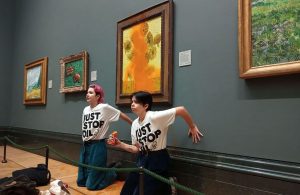 Call for Chapter Proposals:
Call for Chapter Proposals:
Subversive Intrusions: Redefining the Museum Through Activist Interventions
(Routledge, Series in Museology, 2025 possibly Open Access).
Deadline: Apr 8, 2024
The editors are looking for original chapters and shorter contributions (interviews, manifestoes, dialogues, etc.) for an interdisciplinary edited volume exploring the phenomenon of artistic and activist-lead intrusive performances in large European and American museums.
Beginning with the iconic suffragette attacks at the start of the 20th century, museums and galleriesーsymbolically and politically charged spaces serving as aesthetic repositories and public arenasーhave been utilized as highly visible platforms. Here, diverse aesthetic and political claims have been articulated, tested, and performed. These performances, often situated at the intersection of radical political and artistic expression, challenge established norms of conduct within museum spaces, initially designated for passive cultural collecting, aesthetic consumption and contemplation, while advancing critical aesthetic and political agendas.
In 2014, exactly a century and two months after Mary Richardson’s attack on The Rokeby Venus in the National Gallery, Deborah de Robertis, a French feminist artist posed naked at Musée d’Orsay, in front of Gustave Courbet’s Origine du Monde. This performance echoed other feminist intrusions carried out by the Guerilla Girls, Pussy Riot and FEMEN. In May 2018, Nigerian artist Jelili Atiku impersonated a bronze statue, looted during the British conquest of Benin in 1897, standing inside the Musée d’Aquitaine in Bordeaux, France, passionately demanding its repatriation. In June 2020, Congolese-born activist Mwazulu Diyabanza walked through the Musée du quai Branly in Paris, seized a Bari funerary pole, and called for the return of looted artifacts, sparking online attention and subsequent actions across Europe. In May 2022, a climate activist smeared cake on the Mona Lisa at the Louvre in Paris. This was the first of a string of non-violent but disruptive actions in museums by the younger generation of climate activists from European movements such as the Extinction Rebellion, Letzte Generation, and Just Stop Oil. Their aim was to garner increased mainstream attention toward the urgent issue of the climate crisis, standing in line with previous actions by Not An Alternative, Liberate Tate or BP or not BP? (Grindon 2023, Kinyon et al. 2023, Pittas 2023)
Several common elements bring together these « subversive intrusions. »
Firstly, it is a subversive interaction with the museum space itself, disrupting its initial purpose and generating social controversy. This controversy extends into broader debates within and outside the art world, addressing issues such as the colonial provenance of African artifacts in European museums and their restitution, the museal regimes of women’s representation, based on patriarchal objectification, as well as the relationship between museums and fossil fuel industries.
Secondly, these performances share similarities in semiotic and conceptual operations (embodied metaphors, synecdoche, iconoclastic gestures) and employed performative strategies based on open-ended and future-oriented scripts. These scripts both describe and induce social conflict, involving interactions with authorities, potential legal charges, trials and the risk of detainment and deportation. The immediacy of these conflicts makes them apparent and tangible to the public inside and outside the artworld.
Thirdly, these actions are inscribed within the contemporary regime of vision and attention, which has been profoundly influenced by the pervasive presence of social media and screens. In the digital age, the dissemination of these activist interventions is not only rapid but also far-reaching, amplifying their impact and significance beyond the physical confines of the museum space.
For analytical purposes, the volume is tentatively separated into three larger parts:
Part I: Feminist and Queer Interventions:
historical and contemporary performances that challenge patriarchal objectification within the Euro-American art world, and beyond,
Part II: Postcolonial Critiques:
decolonial performances that critique cultural appropriation and colonial legacies, symbolic calls for repatriation and restitution of looted artifacts to their rightful communities, performances related to South-North migration and past or present imperial expansions,
intrusions questioning the ethics of ethnographic museology, etc.
Part III: Ecological Protests
performances that subvert attention towards the urgency of the climate crisis within museum contexts, iconoclastic actions and disruption aimed at challenging the complicity of museums with fossil fuel industries, the role of Western museums in the struggle for climate justice.
Please feel free to propose chapters that may combine these topics or expand the topics by suggesting novel directions.
By interrogating cases of gendered objectification, cultural appropriation, and hierarchical monopolization of vision within Western museums, the contributions to this book explore how these performances (and the actors behind them) contribute to the redefinition of the modern conception of the Western museum.
Please send an up to 500 word proposal to nataliya.tchermalykh@graduateinstitute.ch by 8 April 2024. Please include a short biography of the author(s). If you have an idea you want to discuss further before submitting an abstract, don’t hesitate to get in touch.
Schedule 2024
April 8: Submission of abstracts (500 words) and short bios (200 words) to the editor (nataliya.tchermalykh@graduateinstitute.ch)
April 15: Selection of abstracts and communication to applicants
June 1: Submission of chapter outlines (2 pages)
September 1: Submission of full chapters (around 5000-6000 words)
September-December: Revisions
2025: Submission and Publication of the book
Nataliya Tchermalykh is a visual and legal anthropologist. She teaches anthropology of art at the University of Geneva and the Geneva School of Art and Design. She has completed her doctoral degree at the Department of Anthropology and Sociology at the Graduate Institute of International and Development Studies in Geneva (Switzerland). She has published on such topics as political performance, artistic and feminist dissidence and the role of law in artistic settings. Her book Shifting Landscapes: An Anthropology of Art and War is forthcoming with Toronto University Press in 2025.
Source : https://arthist.net/archive/41503

Leave a Reply
You must be logged in to post a comment.